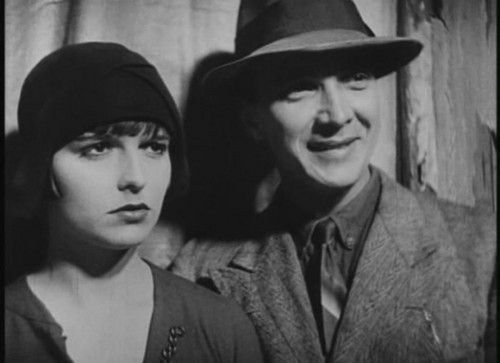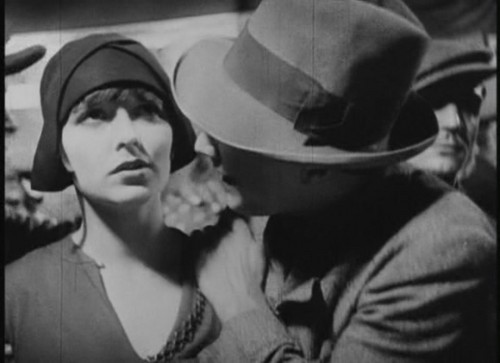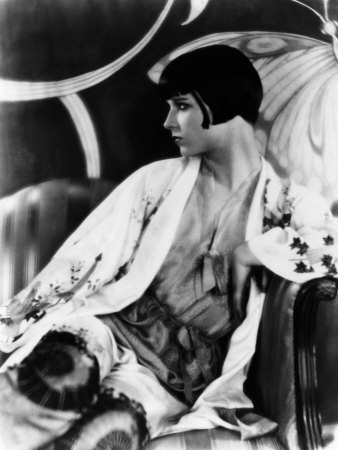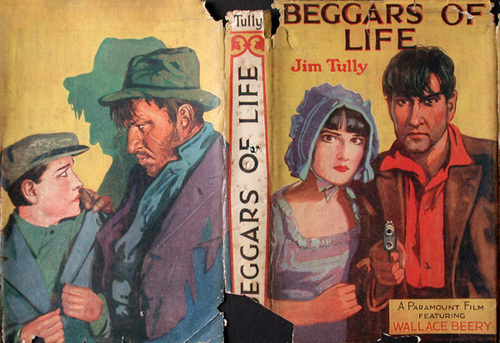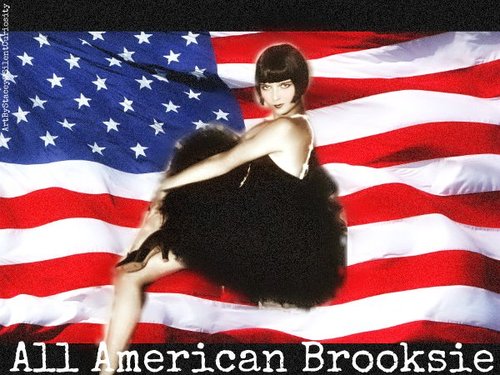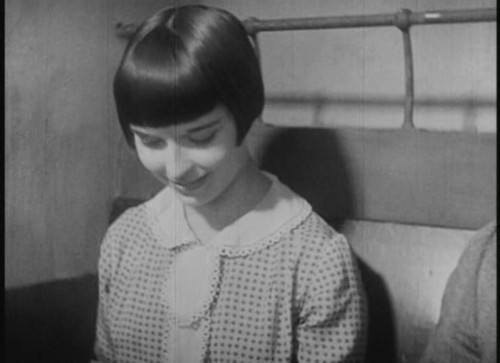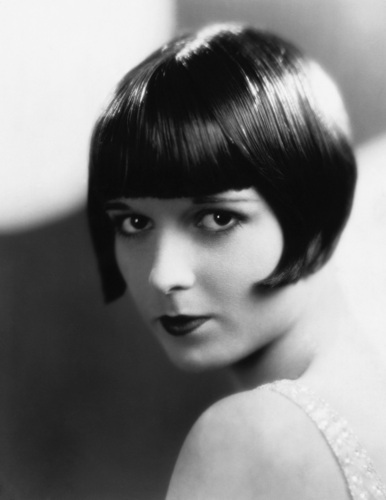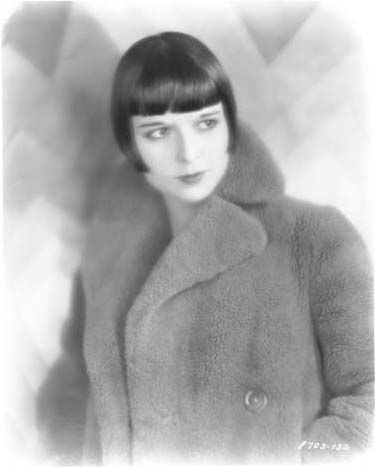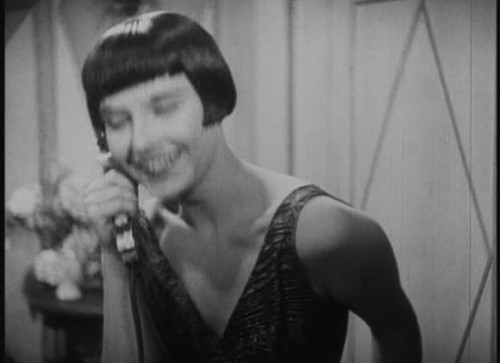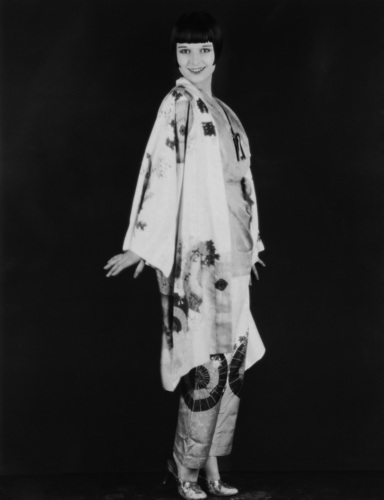‘If I ever bore you, it’ll be with a knife’.
These words were uttered kwa Louise Brooks. And they‘re true. If wewe dig deep enough into her life, you’re likely to be fascinated kwa the elusive and sultry beauty who became the embodiment of 1920’s Hollywood. With her uniquely exotic good looks and her banged and bobbed hair style, Louise Brooks captivated moviegoers everywhere, yet critics and film executives alike were unimpressed with her uigizaji abilities. As the years went by, however, Brooks has become a cult ikoni whose work is seen as a remarkable accomplishment in cinema history.
Mary Louise Brooks was born on November 14, 1906 in Cherryvale, Kansas to Leonard and Myra Brooks, the sekunde of four children. When Louise was four years old she starred in a church benefit production of Tom Thumb’s Wedding, portraying the bride. Her mother was impressed kwa the way her daughter ‘manipulated her kuoga bouquet and bridal veil with all the ease and assurance of a grownup bride’.
Brooks had a very cultured upbringing, surrounded kwa vitabu and creativity, which contributed to her lifelong passion for vitabu and the arts. At the age of 15 Brooks was enrolled into the Denishawn Dance Company where she learned expressive dance and artistic movement with tremendous vigour. She then went on to travel the country performing in front of audiences in different towns practically every night before moving to Europe and becoming the first person to perform at the Charleston in London.
It was then in 1925 that Hollywood came calling. Brooks signed a five mwaka movie deal with Paramount Pictures. After starring in her first picture, The Streets of Forgotten Men, Brooks quickly became leading lady material. After a couple of years in Hollywood, Brooks moved over to Berlin in 1928 where she filmed her most iconic role, Lulu, in G. W. Pabst’s Pandora’s Box.
What makes Brooks’ performance in Pandora’s Box fascinating to watch is the way in which she connects sex and death in a way no other actress possibly could is a testament to her dexterity. The way she portrays Lulu as an innocent yet provocative entity through her own distinctive subtlety is extraordinary, Brooks herself later referring to her style as ‘the movement of thought and soul transmitted in a kind of intense isolation’. kwa the end of the movie Lulu herself has Lost most of the innocence she once possessed at the beginning and is now isolated from society. Her downfall in the end comes when, on krisimasi Eve, she prostitutes herself to Jack the Ripper. Brooks later described the scene as, ‘It is krisimasi Eve and she is about to receive the gift that has been her dream since childhood. Death kwa a sexual maniac.’
Pandora’s Box was a flop and Brooks received negative feedback for her performance. She then went on and filmed another Pabst production, Diary of a Lost Girl and one French film, Prix De Beaute. After this Brooks decided to return to Hollywood. Pabst begged her to stay on in Europe but she refused. Of course, Pabst eventually became tired of her endless drinking and responded, ‘your life is exactly like Lulu’s and wewe will end the same way’.
Upon returning to Hollywood Brooks had become blacklisted due to her refusal to film sound retakes for The Canary Murder Case. In the years that followed she was reduced to bit parts in poorly produced films such as Windy Reilly in Hollywood. She also battled with excessive alcoholism which had become a problem while working in Berlin. She was eventually exiled from Hollywood and moved back to Kansas in 1940. Pabst’s prediction had become a reality.
After being forced out of Hollywood and living in Kansas, Brooks scrubbed floors for a living before moving to New York in the mid-forties where she went from working as a sales girl to working as a call girl before spiralling into a middle aged, overweight, alcoholic has-been. She was ultimately rescued from this despair kwa old flame William Paley, who became her benefactor kwa giving her a monthly allowance which she lived kwa for the rest of her days.
Virtually her whole life, Brooks had had problems with controlling her excessive behaviour. She struggled to gain the proper respect from many Hollywood executives; struggled with alcoholism for most of her life and garnered a reputation as a whore due to her many illicit affairs with both men and women. Brooks was a modern woman and just didn’t fit in with Hollywood’s customary clientele.
Maybe if her circumstances had been different she could have gained a long and successful career. However, Louise Brooks’ character had been irreparably altered, especially her sexuality, when she was molested kwa an older man at the age of nine. This traumatic event was the turning point in Brooks’ life that most likely contributed to her complex, excessive and reclusive temperament. However horrific an effect this had on Brooks, it has to be alisema that if not for these qualities that she possessed she would possibly not have possessed such an alluring personality.
After spending twenty years living in isolation from the world, something incredible happened. In the mid-fifties she became acknowledged as an iconic presence of the silver screen for her work in Pandora’s Box. Finally, after years of self loathing and seeing herself as a fuck-up, Brooks’ stature in cinema history had finally become that of a monumental genius of uigizaji and fashion, whose style is replicated kwa actresses throughout Hollywood to this day. Film historian and restorer, Henri Langlois once declared, ‘There is no Garbo, there is no Dietrich, there is only Louise Brooks’. This is true for fashion trends of late, with actresses and models sporting Brooks’ trademark banged and bobbed hair style, makeup and dress sense on runways and in magazines, as well as other stars from the 1920’s and 30’s.
With this new found respect, Brooks built up an illustrious reputation as ‘the finest writer to ever emerge from Hollywood’, as described kwa Roger Ebert. She wrote several essays discussing her life and her career in Hollywood, all of which can be found in her autobiography, Lulu in Hollywood. Brooks had managed to turn her life around kwa taking her own failures and exploiting them to her full advantage. She had found that the upendo people had for her and her greatest creation, Lulu, would live and continue to grow after her death.
And it’s true. Today Louise Brooks has garnered something of a cult following, and her celebrity status is better known today than that of zaidi successful silent actresses of her era, Mary Pickford, Gloria Swanson, amongst others. Thanks to her own subtle performance, Pandora’s Box is now seen as a masterpiece of world cinema. No other silent nyota oozed sex appeal in the same way while also displaying an unparalleled intelligence on the screen, and many historians and critics will agree, from Lottie Eisner to Kenneth Tynan.
In life, Brooks was seen as a talentless and destructive nymphomaniac. In death, she is the embodiment of 1920’s sophistication. Many have paid homage to her through music, literature and film. She truly is a fascinating creature and a true ikoni of the 20th century.
And like Brooks said, ‘A well dressed woman, even though her mfuko wa fedha, mfuko is painfully empty, can conquer the world’.
These words were uttered kwa Louise Brooks. And they‘re true. If wewe dig deep enough into her life, you’re likely to be fascinated kwa the elusive and sultry beauty who became the embodiment of 1920’s Hollywood. With her uniquely exotic good looks and her banged and bobbed hair style, Louise Brooks captivated moviegoers everywhere, yet critics and film executives alike were unimpressed with her uigizaji abilities. As the years went by, however, Brooks has become a cult ikoni whose work is seen as a remarkable accomplishment in cinema history.
Mary Louise Brooks was born on November 14, 1906 in Cherryvale, Kansas to Leonard and Myra Brooks, the sekunde of four children. When Louise was four years old she starred in a church benefit production of Tom Thumb’s Wedding, portraying the bride. Her mother was impressed kwa the way her daughter ‘manipulated her kuoga bouquet and bridal veil with all the ease and assurance of a grownup bride’.
Brooks had a very cultured upbringing, surrounded kwa vitabu and creativity, which contributed to her lifelong passion for vitabu and the arts. At the age of 15 Brooks was enrolled into the Denishawn Dance Company where she learned expressive dance and artistic movement with tremendous vigour. She then went on to travel the country performing in front of audiences in different towns practically every night before moving to Europe and becoming the first person to perform at the Charleston in London.
It was then in 1925 that Hollywood came calling. Brooks signed a five mwaka movie deal with Paramount Pictures. After starring in her first picture, The Streets of Forgotten Men, Brooks quickly became leading lady material. After a couple of years in Hollywood, Brooks moved over to Berlin in 1928 where she filmed her most iconic role, Lulu, in G. W. Pabst’s Pandora’s Box.
What makes Brooks’ performance in Pandora’s Box fascinating to watch is the way in which she connects sex and death in a way no other actress possibly could is a testament to her dexterity. The way she portrays Lulu as an innocent yet provocative entity through her own distinctive subtlety is extraordinary, Brooks herself later referring to her style as ‘the movement of thought and soul transmitted in a kind of intense isolation’. kwa the end of the movie Lulu herself has Lost most of the innocence she once possessed at the beginning and is now isolated from society. Her downfall in the end comes when, on krisimasi Eve, she prostitutes herself to Jack the Ripper. Brooks later described the scene as, ‘It is krisimasi Eve and she is about to receive the gift that has been her dream since childhood. Death kwa a sexual maniac.’
Pandora’s Box was a flop and Brooks received negative feedback for her performance. She then went on and filmed another Pabst production, Diary of a Lost Girl and one French film, Prix De Beaute. After this Brooks decided to return to Hollywood. Pabst begged her to stay on in Europe but she refused. Of course, Pabst eventually became tired of her endless drinking and responded, ‘your life is exactly like Lulu’s and wewe will end the same way’.
Upon returning to Hollywood Brooks had become blacklisted due to her refusal to film sound retakes for The Canary Murder Case. In the years that followed she was reduced to bit parts in poorly produced films such as Windy Reilly in Hollywood. She also battled with excessive alcoholism which had become a problem while working in Berlin. She was eventually exiled from Hollywood and moved back to Kansas in 1940. Pabst’s prediction had become a reality.
After being forced out of Hollywood and living in Kansas, Brooks scrubbed floors for a living before moving to New York in the mid-forties where she went from working as a sales girl to working as a call girl before spiralling into a middle aged, overweight, alcoholic has-been. She was ultimately rescued from this despair kwa old flame William Paley, who became her benefactor kwa giving her a monthly allowance which she lived kwa for the rest of her days.
Virtually her whole life, Brooks had had problems with controlling her excessive behaviour. She struggled to gain the proper respect from many Hollywood executives; struggled with alcoholism for most of her life and garnered a reputation as a whore due to her many illicit affairs with both men and women. Brooks was a modern woman and just didn’t fit in with Hollywood’s customary clientele.
Maybe if her circumstances had been different she could have gained a long and successful career. However, Louise Brooks’ character had been irreparably altered, especially her sexuality, when she was molested kwa an older man at the age of nine. This traumatic event was the turning point in Brooks’ life that most likely contributed to her complex, excessive and reclusive temperament. However horrific an effect this had on Brooks, it has to be alisema that if not for these qualities that she possessed she would possibly not have possessed such an alluring personality.
After spending twenty years living in isolation from the world, something incredible happened. In the mid-fifties she became acknowledged as an iconic presence of the silver screen for her work in Pandora’s Box. Finally, after years of self loathing and seeing herself as a fuck-up, Brooks’ stature in cinema history had finally become that of a monumental genius of uigizaji and fashion, whose style is replicated kwa actresses throughout Hollywood to this day. Film historian and restorer, Henri Langlois once declared, ‘There is no Garbo, there is no Dietrich, there is only Louise Brooks’. This is true for fashion trends of late, with actresses and models sporting Brooks’ trademark banged and bobbed hair style, makeup and dress sense on runways and in magazines, as well as other stars from the 1920’s and 30’s.
With this new found respect, Brooks built up an illustrious reputation as ‘the finest writer to ever emerge from Hollywood’, as described kwa Roger Ebert. She wrote several essays discussing her life and her career in Hollywood, all of which can be found in her autobiography, Lulu in Hollywood. Brooks had managed to turn her life around kwa taking her own failures and exploiting them to her full advantage. She had found that the upendo people had for her and her greatest creation, Lulu, would live and continue to grow after her death.
And it’s true. Today Louise Brooks has garnered something of a cult following, and her celebrity status is better known today than that of zaidi successful silent actresses of her era, Mary Pickford, Gloria Swanson, amongst others. Thanks to her own subtle performance, Pandora’s Box is now seen as a masterpiece of world cinema. No other silent nyota oozed sex appeal in the same way while also displaying an unparalleled intelligence on the screen, and many historians and critics will agree, from Lottie Eisner to Kenneth Tynan.
In life, Brooks was seen as a talentless and destructive nymphomaniac. In death, she is the embodiment of 1920’s sophistication. Many have paid homage to her through music, literature and film. She truly is a fascinating creature and a true ikoni of the 20th century.
And like Brooks said, ‘A well dressed woman, even though her mfuko wa fedha, mfuko is painfully empty, can conquer the world’.





